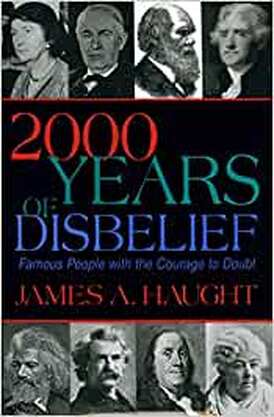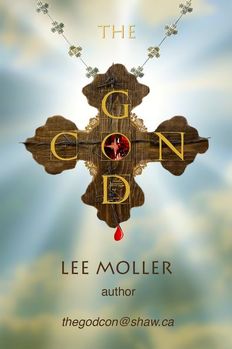2,000 Years of Disbelief; James A. Haught; 1996; Prometheus Books; 324 pgs, bibliography, index18/7/2020  I have always enjoyed a good pithy observation about religion. For thousands of years, very brave men and women have stood up to the BS and said "I do not believe." This can get you killed, even today. Here is a sampling of the books contents: quotes from great thinkers and skeptics through the ages. A Prometheus book, of course! Euripides (400 BCE): He was a wise man who originated the idea of God. Plato (300 BCE): He was a wise man who invented God. Tacitus (100 CE): Christianity is a pestilent superstition. Lucretius (99-55 BCE): We, peopling the void air, make gods to whom we impute the ills we ought to bear. Michel de Montaigne (1533-1592): Men of simple understanding, little inquisitiveness and little instructed, make good Christians. Nothing is so firmly believed as what we least know. Sir Francis Bacon (1561-1626): The more contrary to reason the divine mystery, so much more it must be believed for the glory of God. Thomas Hobbes (1588-1679): Religions are like pills, that must be swallowed whole without chewing. Theology is the kingdom of darkness. Baruch Spinoza (1632-1677): [Believers] are but triflers who, when they cannot explain a thing, run back to the will of God; this is, truly, a ridiculous way of expressing ignorance. John Locke (1632-1704): Every sect , as far as reason will help them, makes use of it (religion) gladly; and where it fails them, they cry out, "It is a matter of faith, and above reason." People who are born to orthodoxy imbibe the opinions of their country or party and never question their truth. Baron de Montesquieu (1689-1755): If triangles made a god, they would give him three sides. Voltaire (1694-1778): Doubt is not a pleasant condition, but certainty is a ridiculous one. Nothing can be more contrary to religion and the clergy than reason and common sense. Sect and error are synonymous. Most of the great men of this world live as if they were atheists. Every sensible man, every honest man, must hold the Christian sect in horror. But what shall we substitute in its place? you say. What? A ferocious animal has sucked the blood of my relatives. I tell you to rid yourselves of this beast, and you ask me what you shall put in its place? If God created us in his own image, we have more than reciprocated. David Hume (1711-1776): The Christian religion not only was at first attended with miracles, but even at this day cannot be believed by any reasonable person without one. If there is a soul, it is as mortal as the body. By priests I understand only the pretenders to power and dominion, and to a superior sanctity of character, distinct from virtue and good morals. Denis Diderot (1713-1784): Men will never be free until the last king is strangled in the entrails of the last priest. Skepticism is the first step toward truth. Edward Gibbon (1737-1974): The various forms of worship that prevailed in the Roman world were all considered by the people as equally true; by the philosopher as equally false; and by the magistrate as equally useful. Hitherto the weight of supernatural belief inclines against the Protestants; and many a sober Christian would rather admit that a wafer is God, than that God is a cruel and capricious tyrant. William Blake (1757-1827): Prisons are built with stones of law, brothels with bricks of religion. Claude Helvetius (1715-1771): A man who believes he eats his God we do not call mad; a man who says he is Jesus Christ we call mad. Baron d'Holbach (1723-1771): Ignorance of natural causes created the gods, and priestly imposters made them terrible. Blaise Pascal (1623-1662): Men never do evil so completely and cheerfully as when they do it from religious conviction. Thomas Paine (1737-1809): All national institutions of churches, whether Christian, Jewish or Turkish, appear to me, no other than human inventions, setup to terrify and enslave mankind, and monopolize power and profit. Priests and conjurors are of the same trade. The study of theology, as it stands in Christian churches, is the study of nothing, it rests on no principles, it proceeds by no authorities, it has no data, it can demonstrate nothing. One good school master is of more use than a hundred priests. Thomas Jefferson (1743-1826): In every country, in every age, the priest has been hostile to liberty. He is always in alliance with the depot, abetting his abuses in return for protection to his own. James Madison (1751-1836): Religious shackles and debilitates the mind and it unfits it for every noble enterprise, every expanded purpose. Napoleon Bonaparte (1769-1821): I am surrounded by priests that repeat incessantly that their kingdom is not of this world, and yet they lay hands on everything they can get. Percy Bysshe Shelly (1792-1822): If God has spoken, why is the universe not convinced. The educated man ceases to be religious. John Stuart Mill (1806-1873): God is a word to express, not our ideas, but the want of them. The ne plus ultra of wickedness is embodied in what is commonly present to mankind as the creed of Christianity. Abraham Lincoln (1809-1865): Both read the same Bible, and pray to the same God, and each invokes His aid against the other. Charles Darwin (1809-1882): For my part, I would as soon be descended from [a] baboon … as from a savage who delights in torturing his enemies … treats his wives like slaves … and is haunted by the grossest of superstitions. Elizabeth Cady Stanton (1815-1902): I found nothing grand in the history of the Jews nor in the morals inculcated in the Pentateuch. I know of no other books that so fully teach the subjection and degradation of women. I have been to many of the ancient cathedrals -- grand, wonderful, mysterious. But I always leave them with a feeling of indignation because of the generations of human beings who have struggled in poverty to build these alters to an unknown god. Henry David Thoreau (1817-1862): I did not see why the schoolmaster should be taxed to support the priest, and not the priest the schoolmaster. Thomas Henry Huxley (1825-1895): I have no faith, very little hope, and as much charity I can afford. The Bible account of the creation is a preposterous fable. The foundation of morality is to … give up pretending to believe that for which there is no evidence, and repeating unintelligible propositions about things beyond the possibilities of knowledge. Extinguished theologians lie about the cradle of every science as the strangled snakes beside that of Hercules. Leo Tolstoy (1828-1910): On may say with one's lips: "I believe that God is one, and also three" -- but no one can believe it, because the words have no sense. Robert Green Ingersoll (1833-1899): Who at the present day can imagine the courage, the devotion to principle, the intellectual and moral grandeur it once required to be an infidel, to brave the Church, her racks, her fagots, her dungeons, her tongues of fire--to defy and scorn her heaven and hell--her devil and he God. The church hates a thinker precisely for the same reason a robber dislikes a sheriff, or a thief despises the prosecuting witness. Give me the storm and tempest of thought and action, rather than the dead calm of ignorance and faith! The church has always been willing to swap off treasures in heaven for cash down. Surely there is grandeur in knowing that in the realm of thought, at least, you are without a chain …. Surely it is worth something to feel that there are no priests, no popes, no parties, no governments, no kings, no gods, to whom your intellect can be compelled to pay a reluctant homage. Mark Twain (1835-1910): Faith is believing what you know ain't so. (Pudd'nhead Wilson) Man is the religious animal. He is the only religious animal, He is the only animal that has the True Religion--several of them. He is the only animal that loves his neighbor as himself and cuts his throat, if his theology isn't straight. He has made a graveyard of the globe in trying his honest best to smooth his brother's path to happiness and heaven. Ambrose Bierce (1842-1914): Christian: One who believes that the New Testament is a divinely inspired book admirably suited to the spiritual needs of his neighbor. One who follows the teachings of Christ insofar as they are not inconsistent with his life of sin. Clairvoyant: A person, commonly a woman, who has the power of seeing that which is invisible to the patron -- namely that he is a blockhead. Religion: A daughter of Hope and Fear, explaining to Ignorance the nature of the Unknowable. Friedrich Nietzsche (1844-1900): Jesus died too soon. He would have repudiated his doctrine if he had lived to my age. Pierre Laplace (1749-1827): Sire, I have no need of that hypothesis. (He was asked why his book Celestial Mechanics did not mention god.) Alexandre Dumas (1802-1870): Catholics and Protestants, while engaged in burning and murdering each other, could cooperate in enslaving their black brethren. Victor Hugo (1802-1885): There is in every village a torch: the schoolmaster-- and an extinguisher: the priest. Emile Zola (1840-1902): Civilization will not attain its perfection until the last stone from the last church falls on the last priest. Elbert Hubbard (1815-1915): … All religions were made and formulated by men … What we call God's justice is only man's idea of what he would do if he were God. George Bernard Shaw (1856-1950): Martyrdom is the only way in which a man can become famous without ability. Clarence Darrow (1857-1938): Every man knows when his life began… If I did not exist in the past, why should I, or could I, exist in the future. H. L. Mencken (1880-1956): The chief contribution of Protestantism to human thought is its massive proof that God is a bore. God is the immediate refuge of the incompetent, the helpless, the miserable. They find not only sanctuary in his arms, but also a kind of superiority, soothing to their macerated egos. Metaphysics is almost always an attempt to prove the incredible by an appeal to the unintelligible. Theology: An effort to explain the unknowable by putting it into terms of the not worth knowing. The most curious social convention of the great age in which we live is the one to effect that religious opinions should be respected. Jean Paul Sartre (1905-1980): Respectable society believed in God in order to avoid having to speak about him. Isaac Asimov (1920-1992): I have never in all my life, not for one moment, been tempted toward religion of any kind. The fact is that I feel no spiritual void. I have my philosophy of life, which does not include any aspect of the supernatural. Gene Roddenberry (1921-1991): If people need religion, ignore them and maybe they will ignore you; and you an go on with your life. It wasn't until I was beginning to do 'Star Trek' that the subject of religion arose again. What brought it up was that people were saying that I would have to have a chaplain on board the Enterprise . I replied "No. I don't".
0 Comments
Leave a Reply. |
AuthorLee Moller is a life-long skeptic and atheist and the author of The God Con. Archives
May 2024
Categories
All
|

 RSS Feed
RSS Feed